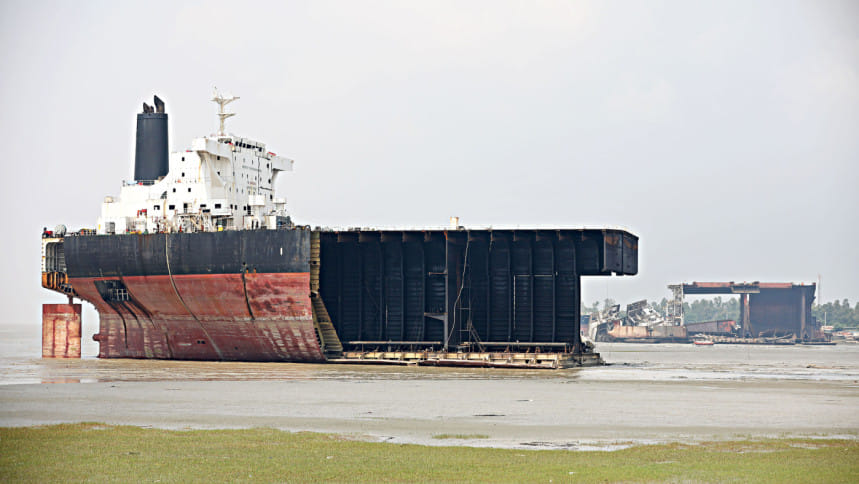Nearly five years on, govt supervision yet to come about

Bangladesh Ship Recycling Act, 2018 was enacted four and a half years ago but its implementation has stayed limited to just the formation of a board.
Construction of waste treatment plants and the board's permanent offices, manpower recruitment, insurance benefits for workers and punishment for law violators after regular inspections are yet to come about.
However, members of Bangladesh Ship Recycling Board, which was formed eight months ago, said processes were underway for these activities.
"The activities of the board have not begun although the board has been constituted," the board's director general, Md Zafar Ullah, also an additional secretary to the Ministry of Industries, told The Daily Star.
"Permanent appointment and recruitment of staff for the board is under process. A proposal for recruitment of workforce is awaiting approval at the Ministry of Public Administration," he said.
"It will not be possible to implement the activities if these works are not completed," he said.
The act, passed in parliament in February 2018, states that a gazette notification informing of the 13-member "Bangladesh Ship Recycling Board" has to be issued as soon as possible after the act comes into being.
The board will have an additional secretary to the Ministry of Industries as the chairman while as members representatives of Bangladesh Customs, Directorate of Environment, Bangladesh Navy, the Bangladesh Ship Breakers and Recyclers Association and others.
The government can appoint any government official as director general of the board and s/he will be the chief executive of the board, says the act.
The main functions of the board are overall supervision and evaluation of ship recycling operations and approval and implementation of government plans.
The members of the board or any person authorised by the board may inspect shipyards, imported ships and ship recycling operations and the yard authorities are bound to render necessary assistance.
If necessary, the board can interrogateany person and collect records, the act said.
Countries around the world enacted their own laws becoming signatories to the Hong Kong International Convention for the Safe and Environmentally Sound Recycling of Ships, 2009.
The convention stipulates that the Bangladesh government has to take effective measures to achieve the necessary capacity within a maximum of five years after formulation of the act.
A treatment plant for ship waste management was supposed to be set up within three years of the act coming into effect but the Ministry of Industries could not decide on the location in the last four and a half years.
Sources said the plant was planned to be located at a convenient location near the economic zone in Mirsharai area.
A study on the plant has already been conducted at a cost of Tk 4 crore and negotiations are underway with Japan International Cooperation Agency (JICA) to finance the project at a cost of around Tk 500 crore. However, nothing has been finalised.
The director general, Md Zafar Ullah, said they were already in discussions with JICA over the financing and this would be done very quickly. The implementation of this project has been delayed mainly due to the Covid-19 pandemic.
Mohammad Siddique, general secretary of the recyclers association, told The Daily Star that though a board was formed last January, all its members were yet to be ensured.
Only two meetings of the board have been held so far. However, the board has no activity since there is no office and workforce of its own, he said.
According to the recyclers association, the ship breaking industry started to take shape at Sitakunda in the 1960s.
About 40 per cent to 50 per cent of the world's old ocean-going ships have been dismantled in the shipbreaking area in the past two decades.
However, accidents involving workers and environmental degradation have been increasing due to a lack of a policy in the country.
The government passed Bangladesh Ship Recycling Act, 2018 in the face of domestic and international pressure.

 For all latest news, follow The Daily Star's Google News channel.
For all latest news, follow The Daily Star's Google News channel. 



Comments